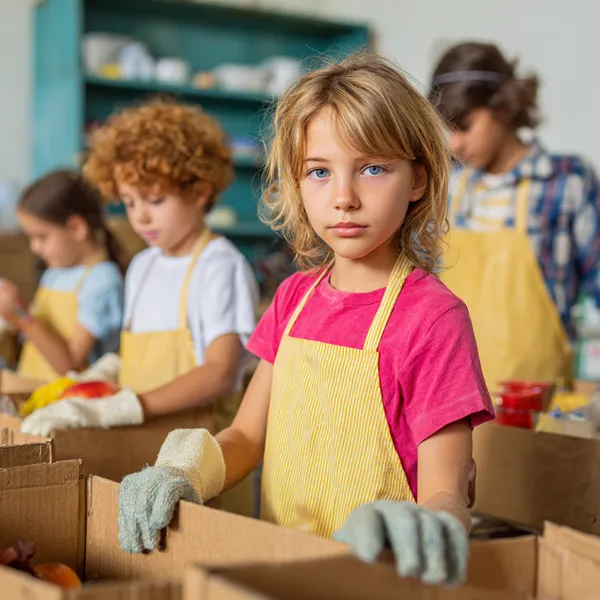So I'm sitting in staff meeting and pastor goes "Kids need to learn about serving others. Let's plan service project for them."
I'm nodding along thinking sounds great in theory until realize he's looking at me like I'm supposed to figure out what that actually means and how to make it happen without total disaster.
Because taking group of kids out into community to help people is basically asking for chaos. Kids who can't sit still for ten minutes during story time now supposed to focus on meaningful service for hours? What could possibly go wrong?
But also know kids need learn that faith isn't just sitting in classroom talking about being nice. They need actually do something that matters.
Turns out organizing service project way harder than expected but also way more meaningful when you see eight-year-old realize they can actually help someone instead of just getting helped all the time.
Picking Project That Won't End in Disaster
First mistake was thinking kids could handle same service projects as adults. Volunteered at soup kitchen figured kids could help serve food.
Showed up with twelve kids ages five through twelve expecting to jump right in. Reality check - kids can't safely handle hot food or sharp knives and most are too short reach serving counters.
Ended up with kids basically standing around watching adults work while getting increasingly bored and restless. Not exactly meaningful service experience I was hoping for.
Now I pick projects specifically designed for kid capabilities. Stuff they can actually do successfully instead of just being cute decoration while adults do real work.
Age-Appropriate Options That Actually Work
Little kids great at sorting and organizing because they love putting things in categories. Food pantry let us come sort canned goods into different bins. Kids spent hour happily organizing soup vegetables fruit while feeling incredibly important.
Elementary kids can handle simple assembly tasks. Made bag lunches for homeless shelter. Kids could make sandwiches wrap fruit pack napkins without adult supervision every step.
Older kids want bigger challenges. Helped at animal shelter walking dogs cleaning kennels playing with cats waiting for homes. Physical work that felt meaningful instead of busy work adults invented keep them occupied.
Transportation Nightmare Management
Assumed parents would drive their own kids to service location. Wrong because half parents working other half don't have reliable transportation for field trips.
Ended up scrambling last minute to arrange carpools and church van while parents texting complaints about communication and logistics.
Now send transportation info week ahead. Church van for families need rides. Meeting location for everyone else. Clear instructions about drop-off pickup times so nobody left stranded at homeless shelter wondering where their parents went.
Preparing Kids Who Have No Clue
Kids from suburban church don't really understand poverty or homelessness or food insecurity. Thought we could just show up and kids would naturally understand why they were helping.
Marcus asked homeless man why he didn't just go buy food at store. Emma wondered why people living in shelter instead of regular houses. Tyler wanted know why everyone looked so sad.
Now we prep kids ahead of time about situations they'll encounter. Simple explanations about why people need help without overwhelming them with world's problems they can't process.
Role playing how to interact respectfully with people they're serving. What to say what not to say how to be helpful without being annoying kids who think they know everything.
Volunteer Adult Coordination
Brought two adult volunteers thinking that would be enough supervision for twelve kids doing service project. Learned hard way that kids need way more adult attention during service work than regular church activities.
Kids get excited about helping then lose focus after fifteen minutes. Need adults redirecting energy and keeping them on task without being drill sergeants about everything.
Now bring one adult for every three kids minimum. More if project involves any safety concerns or interaction with vulnerable populations who don't need deal with kid chaos on top of their other problems.
Managing Kid Expectations vs Reality
Sold project as amazing opportunity to change world and help people in need. Kids showed up expecting to single-handedly solve poverty and homelessness in one afternoon.
When they realized making sandwiches wasn't going to end hunger some kids got disappointed and frustrated. Others got overwhelmed by size of problems they were seeing.
Now frame projects as small way to show love and kindness instead of promising they'll fix everything wrong with world. One person helped at time instead of grandiose world-changing mission.
Time Management With Short Attention Spans
Planned three-hour service project figuring more time equals more service. Wrong because kids max out after about ninety minutes then become completely useless and potentially disruptive.
Watched kids go from enthusiastic helpers to whiny complainers who just wanted go home and play video games. Not exactly servant heart development I was aiming for.
Keep projects short focused. Hour and half max. Better to have kids leave wanting do more than dragging them through experience they're over and done with.
Safety Considerations Nobody Thinks About
Kids at food pantry around lots strangers some dealing with difficult life situations. At animal shelter around unpredictable animals. At homeless shelter around people who might not be comfortable with children.
Need background checks for all adult volunteers. Clear safety protocols for each location. Adult supervision that actually supervises instead of assuming kids will naturally behave appropriately.
Also emergency contact info for all kids plus first aid supplies because someone always gets hurt during field trips. Usually minor but better prepared than sorry.
Follow-Up That Actually Matters
Used to do service project then move on to next thing assuming kids would naturally internalize lessons about serving others.
Kids forgot about experience within week unless we connected it to bigger picture of what it means follow Jesus and care for people in need.
Now we debrief after project. What did they notice? How did it feel to help someone? What surprised them? How can they continue serving in their own lives?
Also try to make service regular part of what we do instead of one-time event they check off their good deed list.
Projects That Worked Really Well
Food pantry sorting because kids could see immediate results of their work and felt genuinely helpful instead of just getting in way.
Animal shelter because kids love animals and could provide real comfort to dogs and cats waiting for homes. Also physical activity that burned off energy.
Making care packages for homeless shelter because kids could use creativity while providing practical items people actually needed.
Nursing home visits where kids performed songs or read stories to residents who were thrilled to have young visitors break up their routine.
Complete Disasters to Avoid
Complex projects requiring skills kids don't have that leave them feeling frustrated and useless.
Long projects that exceed kid attention spans and turn into endurance tests nobody enjoys.
Projects with safety concerns that make adults nervous and kids feel restricted instead of helpful.
One-time events with no follow-up that don't connect to bigger understanding of what service means.
Why Service Projects Actually Matter
Shows kids that faith involves actions not just beliefs and good intentions that don't translate into anything real.
Develops empathy and understanding for people in different situations than their own comfortable lives.
Teaches practical ways to help others that they can continue throughout their lives.
Creates positive associations with serving instead of seeing it as obligation or punishment.
Builds character and confidence by showing kids they can make real difference in someone's life.
Planning Next Projects
Starting with kids' interests and abilities instead of just picking whatever sounds good to adults.
Building relationships with community organizations that want to work with children instead of just tolerating them.
Creating ongoing service opportunities instead of occasional special events.
Connecting service to Bible lessons about loving neighbors and caring for people in need.
Tom volunteered coordinate transportation because he's naturally organized and doesn't panic when logistics get complicated.
Sarah wants help prep kids because she's good at explaining complex situations in age-appropriate ways.
Jessica offered handle communication with service locations because she's patient with endless questions and scheduling changes.
Kids already asking when we can go back to animal shelter because they want to see if dogs they played with got adopted.
Marcus who asked homeless man why he didn't buy food? Now saves part of his allowance to buy supplies for homeless shelter because he understands better what people need.
Emma who was confused about why people live in shelters? Asked her mom if they could volunteer as family because she wants help more.
That's when know service project worked. When kids want continue serving instead of checking it off their list of things they had to do.
Kids ministry service project isn't about making kids feel good about themselves or giving them something to put on college applications. About teaching them that following Jesus means caring for people who need help.
Worth every bit of planning stress when see kid realize they have power to make someone's day better just by being kind and helpful.
YouTube Video:
Podcast Episode:








